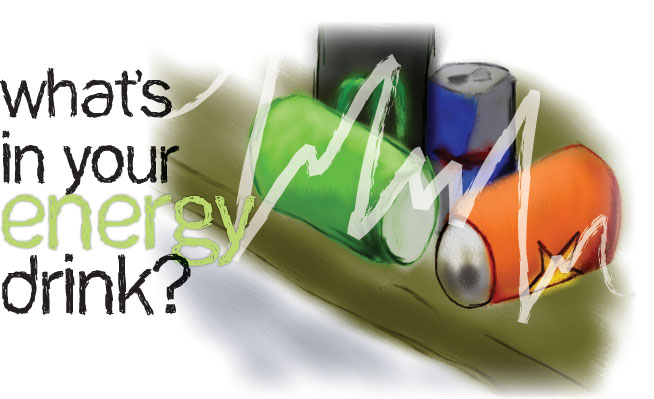Boost from energy drinks could have negative side effects
By Alicia Nierenstein | anierenstein@flagler.edu
When Daniel Wittig needs a boost in his day, he grabs a RockStar Energy Drink, opens it up and drinks it down. There is something appealing to him about the drink, and it is not just the surfing sponsorship he gets from the company.
Like many other college students in America, energy drinks of all sorts are the answer to an all-night study session, an athletic event or major exam. Thirty-one percent of teenagers polled in the United States said they drink energy drinks, and that number has nearly doubled in the past three years, according to a study done by Simmons Research Group.
There are a variety of brands, types and flavors out there, many with names designed to attract a younger consumer.
Many have eye-catching names like DNA, Monster, PimpJuice and Red Bull, along with tempting marketing slogans. Red Bull can “give people wings,” while RockStar allows them to party like one. They can “unleash the beast” with Monster, or “let it loose with PimpJuice.”
But as the popularity of energy drinks increases, so do the concerns of some health professionals who warn about the effects they can have on people, no matter what age. Most energy drinks contain high levels of caffeine, but because the cans do not display this, consumers don’t actually know how much they are taking in.
Webmd.com reported on a Northwestern University study that found more than 250 incidents at the Illinois Poison Center concerning complications from caffeine supplements, and 12 percent of those callers had to be hospitalized. The callers’ average age was 21.
Bea Karnes of NBC News reported another drink, Spike Shooter, was pulled because it sent several teens to the hospital due to the large amount of caffeine content, which is equivalent to three cups of coffee.
“These drinks are not truly dangerous unless you take too many,” said Dr. Bruce A. Goldberger, the Director of Toxicology at the University of Florida. “They will become dangerous medically when stress and anxiety levels rise, resulting in possible heart palpitations, or other side effects.”
Goldberger authored a 2007 University of Florida study that showed that some cans of energy drinks contain as much as four times the caffeine of a soft drink, even though they are often two-thirds the size of a soft drink can. Other drinks he tested had varying amounts, some of which were equivalent to four cans of Pepsi.
A test performed on 14 students at the University of Wisconsin showed that contrary to the common side effect of quickened heartbeat, the combination of caffeine and taurine found in one energy drink actually slowed the heart rate down. The researchers who performed the test were left with only speculation as to the cause of the different effects.
In the face of such research, Goldberger’s recommendation on drinking energy drinks is a common one: use moderation.
“It is not a good idea to drink four of any energy drink in one day,” Goldberger said. “People also need to be especially careful when these drinks are mixed with alcohol.”
RockStar, as well as Red Bull and DNA, did not respond to phone calls or E-mails for comment on this story.
Red Bull does list the answers to some frequently asked questions on their Web site. According to the site, Red Bull is a highly functional drink developed for mental and physical exertion. It also says that people should drink Red Bull on intensive working days, before athletic events, tests or exams. The site answers questions that concern vegetarians, and those who keep kosher.
Wittig, a senior at Flagler, agrees with Goldberger and says that moderation is important.
“I purposely limit myself,” he said. “And you absolutely have to drink water because people try to substitute energy drinks for water, and that just doesn’t work.”
One suggestion by critics of the drinks is to make the general public more aware of caffeine and other ingredients in energy drinks.
The FDA does not require companies to list the amount of caffeine in their products, only that it is present. But Goldberger believes that this should change.
“Beverages should be clearly labeled with the caffeine content listed just as other nutrients are listed,” he said.
The school’s nurse, Holly Hagler, said no student has come in with symptoms caused by an energy drink. However, she has seen a couple of cases in which students have become sick due to taking caffeine pills to boost their energy levels.



Be the first to comment on ""